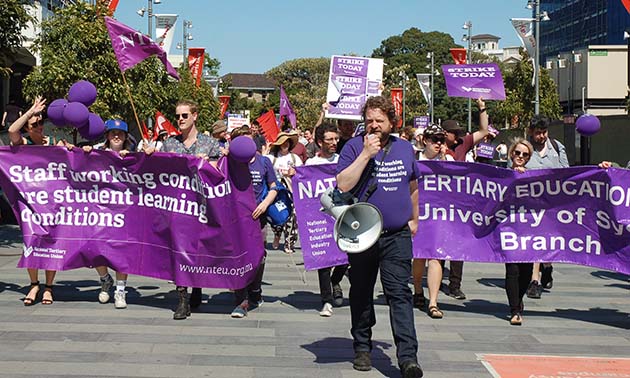After two well-supported strike days and an enthusiastic vote for a 48-hour strike, the NTEU at Sydney University has abruptly voted to accept a new agreement.
Our campaign came to a halt before we had won our core demands of a better pay offer, no forced redundancies, no teaching-only advertised positions, and equal superannuation and sick leave for casuals. The 301-139 vote to settle was a completely unnecessary setback.
The union did have some important wins, particularly around parental leave and casuals’ conditions. These include clauses for casuals to be paid for all work undertaken, and better clauses to increase conversion to fixed-term and on-going positions.
But there is no doubt we could have got more. Sydney University is one of the richest in Australia and can easily afford decent pay and conditions.
The campaign was just getting started. Both the Open Day and the 13 September strike had well attended pickets. Building for these strikes saw increasing numbers of members drawn into activity with leafleting, postering and workplace meetings. Union membership grew with more than 250 people joining since the campaign began.
Unfortunately, behind closed doors, the branch president and vice-presidents had already begun arguing for the strikes to be wound down and for the branch to accept an offer.
NTEU officials
Rather than back the enthusiasm of NTEU members to fight for a better deal, the NTEU state and national offices went to extraordinary lengths to convince members to settle. While the ACTU call centre had not been used to get people to the strike pickets, it was used to get members to a meeting to call the strikes off.
The NTEU national executive, as well as Queensland, Western Australia and NSW divisional secretaries issued statements urging a settlement, disregarding members’ near unanimous resolution for a 48-hour strike.
The NTEU general secretary, Grahame McCulloch, even flew into town to see the Vice-Chancellor. Yet the offer management made on the day after members voted for a 48-hour strike was essentially no different from the offer already rejected.
One of the reasons given for state and federal officials wanting to settle is because of the threat that other universities could try the “Murdoch option” of applying to Fair Work to terminate their agreement and strip conditions back to the award. But the key to beating any Murdoch-style attempt to terminate agreements is a militant and confident union membership. The best answer to the threat was always industrial action. Instead what happened at Murdoch has been used to get members at other universities to settle for agreements that just maintain conditions.
Keep up the fight
With the end of the EBA campaign, we need to ensure the union continues to be relevant to its members. A major university restructure has already begun and we will have to respond to defend jobs. A staff-student campaign against job cuts in 2012 saved over 100 jobs.
Without the no forced redundancy clause, staff will be in a more precarious situation. A limited improvement in extending the redeployment period from 12 weeks to nine months ends in 2019. But it won’t stop people being forced to reapply for jobs at lower wages through “spill and fill” processes and does not apply to academic staff.
The existing change management clauses didn’t save Sydney College of the Arts from closure last year. Jobs have also gone in Science and this month there have been redundancies, including the NTEU delegate, in the IT department.
We can campaign around the new clauses for casuals to build the union. The casuals’ network campaigned over recent months to expose the exploitation of Sydney Talent workers and won these employees coverage by the agreement. Similar campaigns will be needed to ensure implementation of the clauses under the new agreement, including payment for all work.
Over the next period, the union will face many challenges to defend jobs and conditions, to defend subjects and courses, and to fight funding cuts being pushed by the Turnbull government.
We will need an NTEU that is willing to resist casualisation and defend members’ jobs.
The vote to settle was a setback. But a large section of the members did vote to continue the fight for a better agreement. This puts us in a strong position to improve democracy in our union and continue to campaign for a better university. The challenge now is to develop a more organised rank-and-file membership that is able to defend jobs and ready, if necessary, to hold our union leadership to account.
Solidarity members, Sydney Uni NTEU






